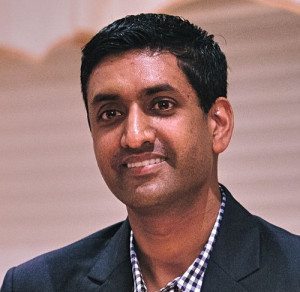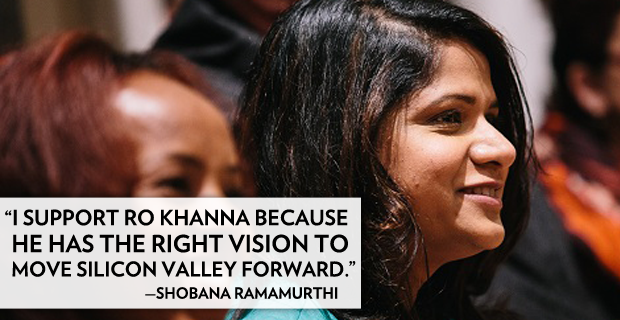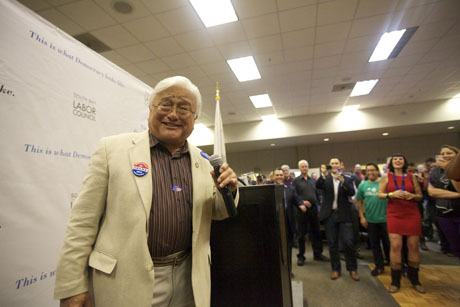
Ro Khanna
Is this young intellectual the Democratic Party’s answer to Ted Cruz?
I’m meeting with Ro Khanna at my favorite cafe in downtown San Leandro. He’s made the trek from Fremont with a couple of campaign aids at his side. It speaks volumes about the power of incumbency that he is making this effort to talk to me, a mere blogger. It’s not as if Khanna is not getting enough press, even the New York Times has covered his race. But he’s frustrated that most coverage has been about how much money he’s raced (over $2 million). He wants to talk about his ideas.
I want to talk about him. More precisely, about what’s behind his seemingly meteoric rise in politics. And, I can’t deny my curiosity, how did he manage to raise so much money in such little time? I suspect some type of political “get rich” scheme gone right, perhaps merged with Machiavellian political instincts. But if Khanna has read The Prince (and I suspect he has), he doesn’t quote him. I’m presented, instead, with a story that is too close to a script for the American story to not be true, the one that generations of immigrants to this country have strived for and a good many have realized in some way. It turns out that Khanna’s story is a that of a smart and fairly pleasant young man, with tremendous dedication to studying, working, volunteering, thinking and debating. Add to that a little risk taking and bravado and you have the story of what made this country great. When I leave the interview, I’m actually hopeful we can be great again.
(and I suspect he has), he doesn’t quote him. I’m presented, instead, with a story that is too close to a script for the American story to not be true, the one that generations of immigrants to this country have strived for and a good many have realized in some way. It turns out that Khanna’s story is a that of a smart and fairly pleasant young man, with tremendous dedication to studying, working, volunteering, thinking and debating. Add to that a little risk taking and bravado and you have the story of what made this country great. When I leave the interview, I’m actually hopeful we can be great again.
At his very core, Ro Khanna is an idealist. He believes in democracy and in public service. He talks about Aristotle, and then quotes Woody Allen (“eighty percent of success is showing up”). He considered working on human rights at the UN or at the World Bank doing economic development, but opted for practicing technology law in Silicon Valley because he is besotted by the spirit of innovation that drives the region. “The meritocracy and openness of Silicon Valley represent America at its best. It’s the America that our founders envisioned, grounded in enlightenment ideals, where the pursuit of knowledge and science are among the highest aspirations.”
More than anything, Khanna believes in the marketplace of ideas. “I want to be heard”, he tells me. “Whether you spread your message by running for office, by writing or blogging or even sending a letter to the editor, the point is to contribute to the public debate”. A while back he’d shown me a letter from President Obama , congratulating him on his recently published book on manufacturing in America. Not being a fan of the President, I had been amused at his excitement. I remind him that Obama endorsed his opponent and ask him why that lettered mattered so much to him. “Are you kidding? To have the President of the United States read my book, hear my ideas? I can’t think of anything more meaningful.”
on manufacturing in America. Not being a fan of the President, I had been amused at his excitement. I remind him that Obama endorsed his opponent and ask him why that lettered mattered so much to him. “Are you kidding? To have the President of the United States read my book, hear my ideas? I can’t think of anything more meaningful.”
Khanna’s first encounter with the the power of the published word came in 9th grade, when an English homework assignment (“get published”) led him to send a letter to his local newspaper decrying the first Gulf War. “Going to war with Iraq,” Khanna recalls writing, “would be appropriate in order to protect democracy in Kuwait, but Kuwait is not a democracy.” His argument drew praise from the newspaper’s editor and taught Khanna that if you make an honest, well thought and well formulated argument, people will listen even if they don’t agree with you. He’s been writing letters to the editor an op-ed columns ever since.
Good grades in public school led Khanna to the University of Chicago, where he studied Economics. I question him about his choice, the Chicago School is often blamed for the economic decline of many a developing country. He assures me that he didn’t know about that when he started at Chicago, but notes that it didn’t matter anyway. “The University of Chicago welcomes debate,” he tells me. “Students are encouraged to think for themselves and challenge their professors. It was a wonderful intellectual experience.”
It was in Chicago that Ro Khanna would get his first taste of an electoral campaign. His boss at the Blue Gargoyle Youth Service Center, where Khanna volunteered as a tutor, was an ardent supporter of a then little known politician by the name of Barack Obama, who was making his first run for the Illinois Senate. He convinced Khanna to join the campaign, and Khanna experienced first hand the thrill of door-to-door canvassing on behalf of the future President.
It wasn’t, however, until Khanna had finished law school, completed a federal clerkship and moved to the Bay Area, that the thought of running for office himself entered his mind. It was 2003, the United States had already entered into two wars and Congress had authorized the Patriot Act, vastly restricting civil liberties and leading in part to the NSA mass surveillance we’re experiencing today. When Khanna found out that Tom Lantos, his representative in Congress, had voted for both the Iraq war and the Act, he decided that a campaign challenge was in order. Let there be a public debate over these issues. Whether he won or lost – and he was pretty sure he would lose -, democracy would be the winner.
His run against Lantos, like his current run against Mike Honda, was a bold move, requiring much more political courage than non-party insiders may realize. The Democratic party does not like interlopers. Politicians are supposed to neatly rise through the ranks, working their way up through local office up to state and then to Congress. Moreover, the party looks askance at primary challenges. You are supposed to wait your turn like a good boy or girl until the seating Democratic office-holder retires. If you don’t follow the rules, you become persona non grata and can say goodbye to your political future.
That Khanna was able not only to survive his 2004 primary defeat, but to thrives on its wake, is a testament both to his commitment and hard work, but also to the magnanimity of the late Tom Lantos. “He invited me to breakfast the day after the election,” Khanna tells me, a smile on his face. “I think he got a thrill by my challenge, he enjoyed debating me. He also understood democracy was about something greater than the candidates.”
A few weeks after the election, Khanna took a leave of absence from work, flew to Washington DC and knocked on the doors of the Democratic National Committee. He was there to volunteer on John Kerry’s presidential campaign. “At first they didn’t have much for me to do,” he tells me. “So I started calling Asian Americans and telling them about Kerry. After some time they found me a chair, then a phone, later a desk and a business card, and finally I got a $1,000 a month stipend and the title of Liaison to the Indian American community.”
I grow bored with Khanna’s political and professional career. Not his fault, I have a short attention span. He went back to San Francisco. He worked with Pelossi, Eshoo and Lofgren to bring Silicon Valley and the Democratic Party together and create an Innovation Agenda. He campaigned for Hillary Clinton and then for Obama. Her served in the administration and worked hard to integrate labor’s voice into the Commerce Department’s agenda. He moved back to California and decided to run for Congress. “Our current Congressional system is broken.” He tells me. “There are too many special interests and very little gets done. I am running because Silicon Valley can help change politics, bringing new, out of the box thinking to Washington and pushing for more responsive and transparent government.”
I finally give him a chance to talk about his ideas. He wants to tell me about his vow to not take money from PACs. “It’s easy for you to say that,” I tell him, “you are getting all this money from Silicon Valley billionaires.” It turns out, however, that this is not quite true. “Even the richest individual can only give you $5,200,” he tells me. “It’s a lot of money, but at the end of the day less than 1% of what we’ll raise. That means that when you only take money from individuals, you have to listen to their many voices, and they won’t always agree.” Apparently, getting those $5,200 checks is not easy either. It involves having lots of one-on-one meetings to sell his agenda and his convictions. “Politicians take PAC money because it’s easier and they can be lazy about it,” he says. “You have a breakfast meeting in Washington, invite a room full of lobbyists and you’ve funded your next campaign. But then, you are in their pocket. They know you haven’t developed the personal relationship with individual donors and that you need them.”
Khanna’s stand against PAC money also hearkens back to his training in political philosophy. At Yale, he was a pupil of Bruce Ackerman and would later do research for Lawrence Lessig. Both academics are known for their writings about the corrupting power of money in politics. Ackerman has endorsed him, but it’s Lessig’s better known name which is worth gold- and votes – in Silicon Valley. So far, Khanna can’t use it. Khanna tells me he hopes Honda will agree to a pledge of disavowing any independent expenditures on their race, just like Elizabeth Warren did on hers. I hope Khanna will, regardless.
The more I talk to Khanna, the more I think I erred when I described him as a technocrat and the Democratic answer to Paul Ryan. Khanna is actually a democrat with a small “d”, an intellectual who has not abandoned his youthful infatuation with the liberal political philosophy that fueled the American Revolution. If anything, Khanna is the Democratic answer to Ted Cruz. I ask him by e-mail what he thinks about that comparison. His response: “Ted Cruz comes from the philosophical right and I articulate a philosophical basis for progressives. I offer an economic rejoinder to Ryan, a philosophic rejoinder to Cruz, and a return to our founding ideals to ground a new progressive movement that aspires to see America as Athens, not Sparta, shaping a world of liberal democratic states.” I drool.
My one worry about Khanna is that he won’t be able to keep the promises he makes. That once he is in Congress, he’ll abandon his ideals and in his zeal to “get things done”, he will take ethical shortcuts to the detriment of sound public policy. I can’t help but think of how Obama campaigned on restoring the rule of law, only to work consistently to destroy it once in office. I share these concerns with him. He writes back:
“I am reminded of Orwell. Power corrupts and absolute power corrupts absolutely. The revolutionary pigs in Animal Farm become the very guardians of the status quo they fought against. What I think can help me guard against that is precisely the literary and philosophical education, which cautions against dogmatism, or linear progress, and reminds us of our fallibility, humanity, and relative place in a very large universe.”
Khanna’s “back to basics” political philosophy has gained him the enthusiastic support of key constituencies in Silicon Valley, from young people to libertarianish techies and politicized immigrants. But it will not win him the election. He is, I remind myself as do others, unproven. What Khanna does have is enough money to make the case for himself, to air his ideas in the democratic marketplace so that voters can truly chose who will represent them best in Washington. Khanna, the would-be political philosopher, will get to experience democracy in action.


 “In the general course of human nature, a power over a man’s subsistence amounts to a power over his will.”
“In the general course of human nature, a power over a man’s subsistence amounts to a power over his will.” The following resolution was unanimously passed by members of the Alameda County Democratic Central Committee on Sep. 4, 2013
The following resolution was unanimously passed by members of the Alameda County Democratic Central Committee on Sep. 4, 2013
 I like Ro Khanna, but I’m still backing Mike Honda
I like Ro Khanna, but I’m still backing Mike Honda Chances are that Khanna will too. The political philosophy he has espoused has not differed much from Honda’s. Rather than on political differences, Khanna’s campaign will rest on his youth and energy, his yet-to-be-announced fresh ideas, his ability to inspire and motivate people (Khanna has not only won the favor of the Silicon Valley upper crust, he has also been building a very strong grass root movement of people who really believe in him) and his potential of becoming a liberal counterweight to
Chances are that Khanna will too. The political philosophy he has espoused has not differed much from Honda’s. Rather than on political differences, Khanna’s campaign will rest on his youth and energy, his yet-to-be-announced fresh ideas, his ability to inspire and motivate people (Khanna has not only won the favor of the Silicon Valley upper crust, he has also been building a very strong grass root movement of people who really believe in him) and his potential of becoming a liberal counterweight to